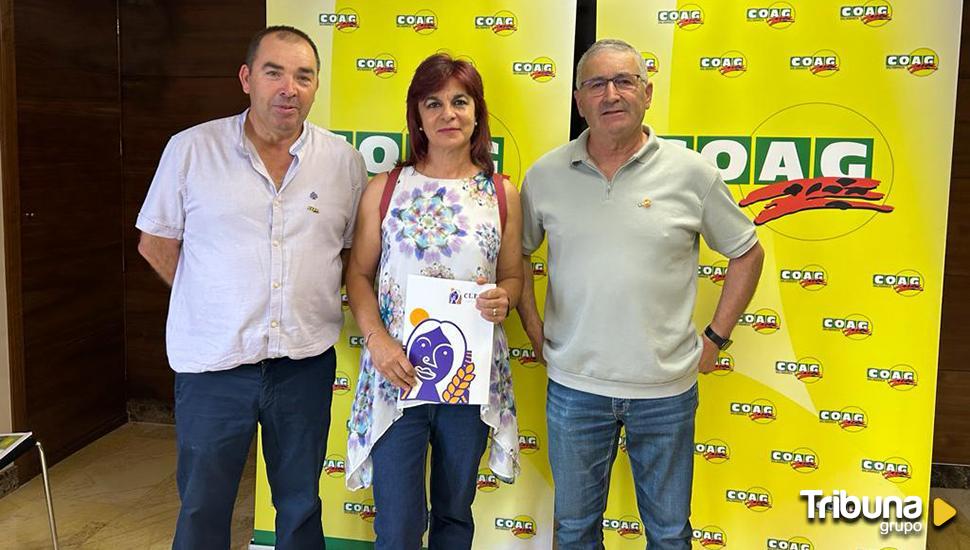Coag Salamanca has held in To shake an extraordinary session with affiliates and members of the union leadership in Salamanca and Castilla y León to value what the agricultural year has been and set some guidelines for what we are going to do in the agricultural year that begins now. A “very complicated campaign for Salamanca” and with many health problems and production costs in livestock.
In this sense, Lorenzo Rivera, regional coordinator of Coag, recalled that professionals have faced a “very tough year with less and less rainfall, a great drought that has affected not only agriculture, but also livestock. Climate change is bringing new diseases to latitudes where they were not known, which are causing great damage to all farmers.”
Specifically, they have referred to the epizootic hemorrhagic diseasewhich “has already spread through half of Spain”, for which They ask for help, a clear protocol and a vaccine to deal with the disease. “It is a notifiable disease for which we do not have a vaccine and there is a great problem and, above all, great concern among farmers because there is no remedy for it other than anti-inflammatories and letting it pass,” Rivera assured.
Before the next meeting with the Ministry, from the agrarian union they emphasize the need for there to be “coordination to have some control of the disease.” In addition, they ask that work be done on the development of a vaccine so that it will be effective next year. “In the laboratory, if there are no reported cases, if there is not enough cattle that needs that vaccine, it will not be investigated and a vaccine will not be released,” Rivera said. For this reason, he has asked that all cases be reported, since “so next year we will have a better chance of this vaccine being available and we can deal with it as we are dealing with bluetongue.”
Likewise, Lorenz Rivera has requested direct aid for the affected farmers. “They have enough with them with the high costs that they are having this year, the drought and, in addition, a disease like this that is new, that was from other latitudes, it is true, but through the winds, through North Africa, He already moved here last year. And he has come to stay, unfortunately”, he assured.
In this sense, the provincial coordinator of COAG Salamanca, Juan Manuel Cortés, has demanded a “clear” protocol from the Ministry and the Board. “Until now the cases have not been collected. It is the majority complaint from the farmers who called the veterinary units. The response was ‘okay, now we know that it is happening, that you are in areas of prevalence with animals infected with the mosquito bite ‘”.
On the other hand, from the agrarian organization they have shown concern about the possibility that this disease ends up affecting more than 60 percent of the extensive cattle herd of the Community. “The mortality that was calculated in this disease, between one and two percent, we assume that it will be far exceeded,” Rivera assured, although he acknowledges that “these rains can help a lot, if they end up falling , and the drop in temperatures. However, according to his words, “the farms that already have this disease introduced have had abortions, low deaths, and, above all, the weakest and oldest animals are the ones that are suffering the most.”
The disease began in November 2022 and transmission occurs through a mosquito bite. “It is not transmitted between animals, nor is there a possibility of zoonosis to people, and all the meat and milk does not have any problem for human consumption, but it does cause serious damage to the cattle herd,” he explained.
“It started in Andalusia, continued in Extremadura, Castilla la Mancha, and it caught us in July and August, without holding those coordination meetings with the autonomous communities. With the high temperatures it progresses more quickly. Veterinary and medication expenses are they shoot and, except for insecticides, we cannot fight in any other way. We are hardly going to kill mosquitoes with cannon shots, it is impossible,” he insisted.
OTHER SECTORS
On the other hand, from COAG they have remembered that the agricultural year that has concluded has been “very complicated” for other sectors such as the beekeeping or rainfed cereal, which “are in losses”.
2023-09-02 14:36:32
#COAG #asks #clear #protocol #vaccine #fight #bovine #hemorrhagic #disease


